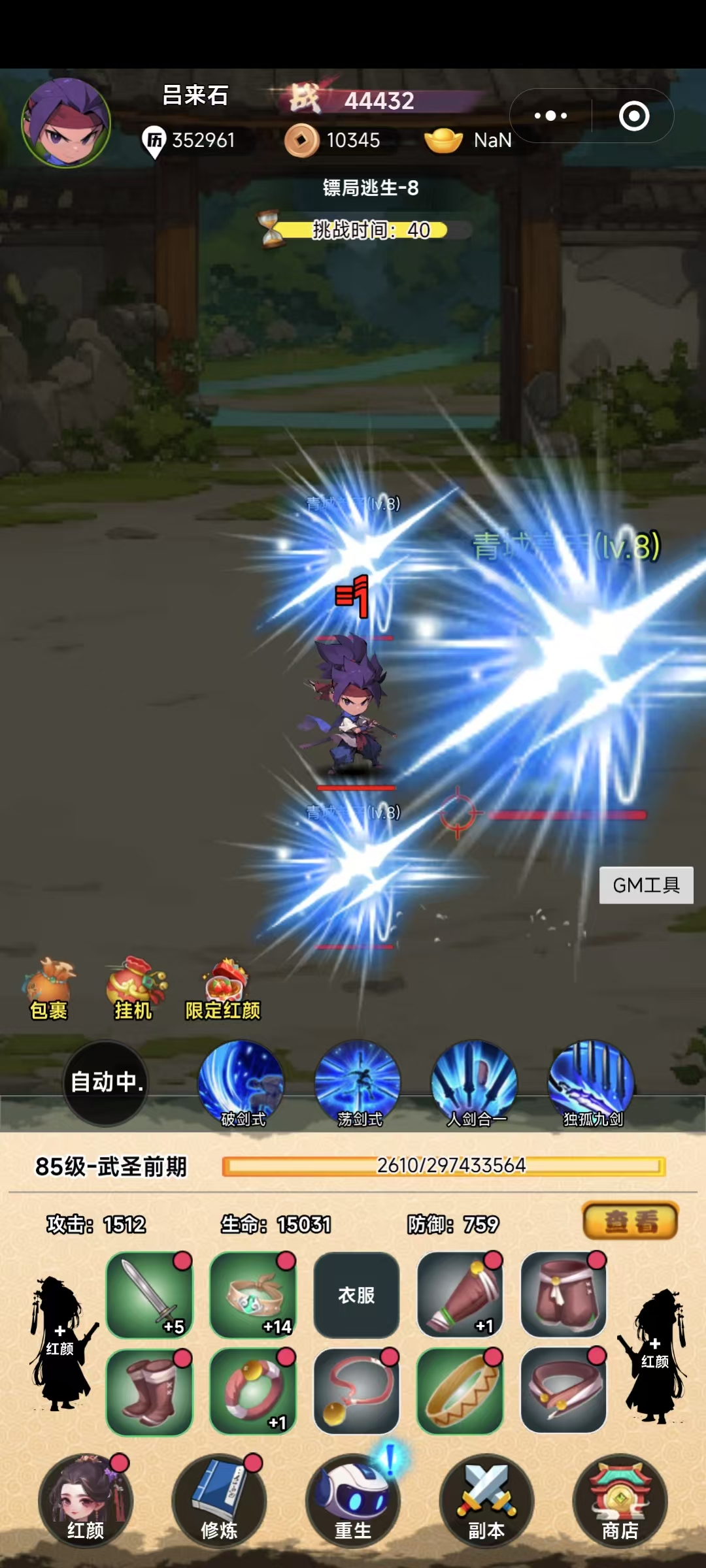The unseen creators: how AI powers the mini-games becoming online hits in China
AI is making the mini-game production process faster and cheaper.
By Liu Honglin
December 2024

A man plays a popular “mini-game” while waiting for the train in Hong Kong.
In three quick strokes, a blue-haired swordsman unleashes curved, shining blue blades for an attack that appears effortless as it takes down three masked opponents. Moments later, the swordsman stands still with a steely gaze and a calm face.
This video game scene features a high-level of production quality, including an armor system, cartoon characters, dramatic visual effects and diverse enemies. It’s all part of a “mini-game” in production for the Chinese social media platform WeChat.
The game is being created under the supervision of Lan Hua, a former game developer at Chinese tech company Tencent. He is responsible for the art design, while his brother handles the programming. Neither have any formal training for their respective roles, and his brother only began learning to code computer programs about a year ago.
While game production can be very difficult and time-consuming, this small team is producing impressive content at a rapid pace. Lan’s team previewed their new title in November 2024 and said they plan to release it in this month.
They are, however getting some help from artificial intelligence.
The world has been stunned by mind-blowing videos, often featuring AI-generated footage, that have been posted online in recent years. Relatively few viewers, however, realize that the technology is also being used to create the mini-games in China that are increasingly popular on social media such as WeChat and the video-sharing app TikTok.
The browser-based applications embedded within WeChat, one of China’s largest communication platforms, allow users to play games quickly without needing to download them separately. Mini-games were first introduced in China in 2017, and since then, have rapidly gained popularity among WeChat’s vast user base.
These mini-games are incredibly profitable. According to Pocket Gamer, a site focused on mobile and handheld gaming, mini-program mobile games generated US$2.3 billion (around HK$295 billion) in revenue in the first half of 2024 in China, marking a 60% increase year over year. Now, thanks to AI, the production process is much faster and cheaper.
Lan’s mini-game took only five months to develop—incredibly quick by industry standards.
“Everything you see, including the game’s maps, characters, and armor, was generated by AI,” Lan said, adding that AI also saved him a lot of time on programming as he used it to generate many of the programs he needs and help him with code correction.
“It is pretty common for game developers to use AI nowadays,” Lan said, explaining how AI generators are trained on extensive datasets that allow the software to learn various aspects and characteristics of the characters they will create.
The generators can be used to create new images that closely resemble the style and content found in the training data, said Professor Kenny Chow K.N. from Hong Kong Baptist University Department of Interactive Media.
Due to the limitations of current technology, there have not been many success cases where 3D game developers used AI. However, there are games such as Treacherous Waters Online, which have implemented AI into non-player characters to give instant personal interactive feedback to players according to their actions.
Chow said mini-games, thanks to their simplicity, primarily consist of 2D interactive interfaces built from text and images.
“Current AI technology has advanced significantly in the realms of words and images,” Chow said.
One common concern about the use of AI for such productions is whether it is legal to use the software if it is trained using copyrighted work of other artists and companies. According to Hong Kong barrister and HKBU part-time lecturer Andrew Christopher Lau, the legality varies by country.
“In the US, AI-generated content is not considered protected by copyright, but Hong Kong law does offer some protections,” Lau said. In mainland China, according to a Beijing Internet Court ruling in 2023, such copyrights belong to the human creators.
However, Lau said there is still ambiguity regarding who is considered the author of content developed with the new technology. One question is whether the credit is due to the person using the AI or the company behind the software they use.
Ethical questions have also been raised by the use of artificial intelligence for creating mini games and other productions. Since AI generators need learning examples to study, imitate, and produce content, many workers in creative industries have complained that training exploits their creativity.
The ethical concerns have sometimes resulted in legal battles. In 2023, a group of artists brought a lawsuit against Stable Diffusion for the unapproved use of their artworks.
As a game developer, Lan says he focuses more on the practical side of production.
“If I use AI-generated images that are too similar to existing artworks, I could run into trouble,” Lan said. He said that before confirming the basic art style of a mini-game, he tries different styles to avoid falling into a copyright trap.
But another major problem for AI-generated games using today’s software is the fact that many productions are still not very attractive.
“These AI-generated mini-games tend to be quite similar and simplistic and with many clichés,” said mini-games player Sam Song. He said he primarily plays the games to pass time while waiting for the subway.
Lan said that appeal matters since most mini-game developers have to spend extra money to buy advertisements and promotions on various social media platforms to grab more players, he said.
Despite all the current difficulties, Lan believes in the potential of AI in game development in future.
“AI can’t do everything for you,” he said, “but with the right instructions, it is the best tool.”

Screenshot of a mini-game.

It is pretty common for game developers to use AI nowadays

Burned out Chinese teachers struggle with school responsibilities
It’s after 10pm and the city streetlights have long been on in southeastern China. Melisa returns home, exhaustion written on her face. All she wants is a shower
Loneliness drives new ‘accompanying economy’
Solo travelers hire “photo companions” for travel pics and conversation
Facing Death: A young mortician in China
A young mortician in China provides “dignity for the dead and comfort to the living.”




